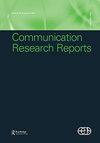One size doesn’t fit all: forms of social technology differentially predict distress
IF 1.9
Q2 COMMUNICATION
引用次数: 0
Abstract
ABSTRACT The current study explored diverse forms of social technology and their corresponding links to distress and well-being during the COVID-19 pandemic. A multinational sample of 302 adults in the United States, Mexico, and Japan self-reported on their use of various forms of social technology, psychological distress, and happiness. Results revealed cultural differences in the amount of social technology use (Mexicans highest, Japanese lowest). While total social technology use positively predicted both distress and happiness, specific forms of social technology differentially predicted distress and happiness. Videoconferencing was associated with lower distress and greater happiness, whereas social media was associated with greater distress and lower happiness. Findings also showed that the use of dating apps was a marginally significant negative predictor of both distress and happiness. These findings suggest that forms of social technology that better mirror in-person interaction may confer greater mental health benefits compared to those that are less naturalistic.一种方法并不适用于所有人:不同形式的社交技术对痛苦的预测不同
摘要当前的研究探讨了新冠肺炎大流行期间各种形式的社会技术及其与痛苦和幸福的对应联系。一项针对美国、墨西哥和日本302名成年人的跨国样本,自我报告了他们对各种形式的社交技术的使用、心理困扰和幸福感。结果显示,在社会技术使用量方面存在文化差异(墨西哥人最高,日本人最低)。虽然总体社会技术的使用对痛苦和幸福都有正向预测,但特定形式的社会技术对痛苦和快乐的预测不同。视频会议与较低的痛苦和较高的幸福感相关,而社交媒体与较高的痛苦和较低的幸福感有关。研究结果还表明,约会应用程序的使用对痛苦和幸福都有轻微的负面预测作用。这些发现表明,与那些不那么自然主义的社交技术相比,更好地反映人际互动的社交技术形式可能会带来更大的心理健康益处。
本文章由计算机程序翻译,如有差异,请以英文原文为准。
求助全文
约1分钟内获得全文
求助全文

 求助内容:
求助内容: 应助结果提醒方式:
应助结果提醒方式:


